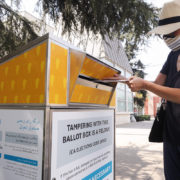OAKLAND — President Donald Trump took to Twitter on Tuesday to urge the California Republican Party to “fight on” in its move to collect ballots in unofficial “drop boxes’’ around the state, in defiance of legal threats from state officials.
Trump’s comments come a day after top California officials sent the state party a cease-and-desist notice, ordering them to remove the unofficial ballot drop boxes. The appearance of the boxes prompted Gov. Gavin Newsom to accuse California Republicans of being “willing to lie, cheat and threaten our democracy all for the sake of gaining power.”
— Credits
Featured Image, Mario Tama/Getty Images
Full article @ Politico
— Related
The Civil Rights Act of 1964 (Pub.L. 88–352, 78 Stat. 241, enacted July 2, 1964) is a landmark civil rights and labor law in the United States that outlaws discrimination based on race, color, religion, sex, national origin, and later sexual orientation. It prohibits unequal application of voter registration requirements, racial segregation in schools and public accommodations, and employment discrimination.
Initially, powers given to enforce the act were weak, but these were supplemented during later years. Congress asserted its authority to legislate under several different parts of the United States Constitution, principally its power to regulate interstate commerce under Article One (section 8), its duty to guarantee all citizens equal protection of the laws under the Fourteenth Amendment, and its duty to protect voting rights under the Fifteenth Amendment.
The legislation had been proposed by President John F. Kennedy in June 1963, but it was opposed by filibuster in the Senate. After Kennedy was assassinated on November 22, 1963, President Lyndon B. Johnson pushed the bill forward. The United States House of Representatives passed the bill on February 10, 1964, and after a 54-day filibuster, it passed the United States Senate on June 19, 1964. The final vote was 290–130 in the House of Representatives and 73–27 in the Senate. After the House agreed to a subsequent Senate amendment, the Civil Rights Act was signed into law by President Johnson at the White House on July 2, 1964.
Source – Civil Rights Act of 1964 (Updated: 12 October 2020) Wikipedia. Available at https://en.wikipedia.org/wiki/Civil_Rights_Act_of_1964, (Accessed: 13 October 2020)

